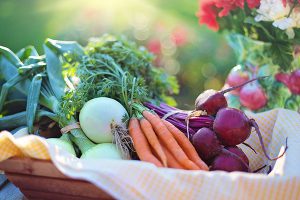Trying to eat clean and stay on a budget? Let the Dirty Dozen and Clean Fifteen lists from the Environmental Working Group (EWG) help you decide when buying organic produce matters most for your health.
What Is the Environmental Working Group?
The Environmental Working Group (EWG) is a non-profit organization dedicated to protecting our health and the environment. They conduct research and provide educational materials to empower all of us to choose safer products and live healthier lives in a healthier environment.
From pesticides in our food, to chemicals in our tap water, to toxins in our personal care and cleaning products, the EWG conducts a vast amount of research every year to help consumers make safer choices. In addition to the famous Dirty Dozen and Clean Fifteen lists of pesticides in produce, the EWG also publishes:
- Skin Deep Database – Looking for some new lotion, shampoo, body wash, or makeup? Start here! Need some new laundry detergent? Check out our Clean. Green. Laundry. post to learn how the EWG can help you with that too!
- Guide to Sunscreen – Ready to hit the beach? Find out what’s in your favorite sunscreen.
- National Tap Water Database – Wondering what’s in your water? EWG can tell you. And the best part is, if your water isn’t as clean as you thought, they don’t just leave you hanging!
- Water Filter Guide – Once you’ve learned what contaminants are in your local tap water, use this tool to find which water filters will remove the contaminants specific to your area.
- Specific research reports, like this one on Glyphosate in Breakfast Cereals and Glyphosate in Food Marketed to Children. Yikes!
What is the “Dirty Dozen”?
The Dirty Dozen is a list of the 12 fruits and vegetables that are most contaminated with pesticides and chemicals. These are the products that you want to prioritize buying and eating organic. Curious? Check out the latest Dirty Dozen list from EWG.
What is the “Clean Fifteen”?
The Clean Fifteen is a list of the 15 fruits and vegetables that have the least amount of pesticide or chemical residue. If you’re looking to save money on your food budget, these are the fruits and vegetables that you can feel good about buying conventionally (instead of organic). Check out the latest Clean Fifteen list from the EWG.
What Changed in 2019?
If you’ve been following the EWG’s Dirty Dozen and Clean Fifteen for a while, you might be wondering, what changed in 2019? Well, not a whole lot. Other than a few shifts in order, the biggest differences between the 2018 and 2019 lists are:
- Dirty Dozen – A newcomer, Kale, jumped into the list at #3. Right behind Spinach. Another good reminder that leafy greens are best purchased organic!
- Clean Fifteen – Mushrooms joined the list at #14, and Mangoes (previously #9) got the boot. So next time you’re at the grocery store, you might be able to save a little money on conventional mushrooms, and you may want to consider that bag of organic frozen mango for your next batch of smoothies.


 Clean. Green. Laundry.
Clean. Green. Laundry.